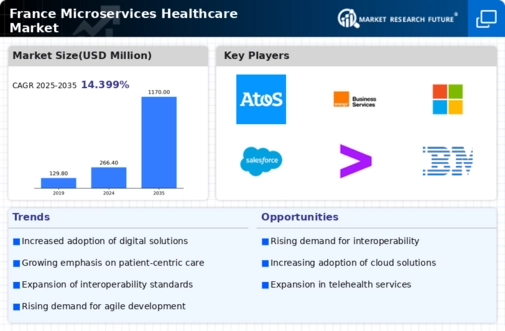Integration of Advanced Technologies
The integration of advanced technologies such as artificial intelligence (AI) and machine learning (ML) is significantly influencing the microservices healthcare market in France. These technologies facilitate the analysis of vast amounts of healthcare data, leading to improved decision-making and operational efficiency. For instance, AI-driven applications can enhance diagnostic accuracy and optimize treatment protocols. Reports indicate that the adoption of AI in healthcare is projected to grow by over 40% in the coming years. This technological advancement not only streamlines processes but also enhances patient outcomes, thereby driving the demand for microservices solutions that can seamlessly incorporate these innovations.
Shift Towards Value-Based Care Models
The transition from volume-based to value-based care models is reshaping the microservices healthcare market in France. This shift emphasizes the quality of care provided rather than the quantity of services rendered. Microservices architecture supports this transition by enabling healthcare providers to develop applications that track patient outcomes and measure the effectiveness of treatments. As value-based care becomes more prevalent, healthcare organizations are likely to invest in microservices solutions that facilitate performance measurement and reporting. Current estimates suggest that value-based care initiatives could account for over 30% of healthcare spending in France by 2026, further driving the adoption of microservices in the healthcare sector.
Increased Focus on Data Security and Compliance
Data security and compliance are paramount concerns within the microservices healthcare market in France. With the rise of digital health solutions, healthcare organizations are prioritizing the protection of sensitive patient information. The implementation of microservices architecture allows for enhanced security measures, enabling organizations to comply with stringent regulations such as the General Data Protection Regulation (GDPR). As a result, healthcare providers are more inclined to adopt microservices solutions that offer robust security features. It is estimated that around 60% of healthcare organizations in France are actively seeking solutions that ensure data integrity and compliance, thereby driving growth in the microservices healthcare market.
Rising Investment in Digital Health Initiatives
Investment in digital health initiatives is on the rise within the microservices healthcare market in France. As healthcare systems increasingly recognize the importance of digital transformation, funding for innovative health technologies is expanding. This trend is reflected in the growing number of startups and established companies focusing on developing microservices-based solutions. Recent statistics indicate that investment in digital health in France has surged by approximately 25% in the last year alone. This influx of capital is likely to accelerate the development and deployment of microservices applications, enhancing the overall efficiency and effectiveness of healthcare delivery.
Growing Demand for Personalized Healthcare Solutions
The microservices healthcare market in France is experiencing a notable shift towards personalized healthcare solutions. This trend is driven by the increasing demand for tailored medical services that cater to individual patient needs. As healthcare providers seek to enhance patient engagement and satisfaction, the adoption of microservices architecture allows for the development of customized applications that can integrate various health data sources. According to recent data, approximately 70% of healthcare organizations in France are investing in technologies that support personalized care. This growing emphasis on individualized treatment plans is likely to propel the microservices healthcare market, as it enables providers to deliver more effective and efficient healthcare services.
















